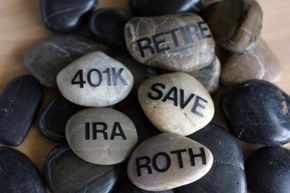 “Sussing out your options and plotting a course for retirement savings can be daunting. But more options means you can tailor your savings to your needs.© AndrewWilliam/iStock
“Sussing out your options and plotting a course for retirement savings can be daunting. But more options means you can tailor your savings to your needs.© AndrewWilliam/iStock
The most common source of retirement income is Social Security. In fact, 86 percent of Americans 65 and older depend on their social security checks every month. For 36 percent of retirees, it’s their primary source of income [source: Brandon]. Yet in 2014, the average payment for individuals was less than $1,300 [source: Brandon]. And only slightly more than 40 percent of retirees have some sort of pension plan [source: Brandon]. With statistics like these, what do currently working employees need to do to build a solid nest egg for their own retirement?
Traditional 401(k) retirement plans allow employees to contribute pre-tax dollars to their accounts. This reduces their gross income and, consequently, their current tax load. In 2006, employees were given yet another financial retirement choice: the Roth 401(k). By 2011, half the companies that offered 401(k) plans included the Roth option [source: NBER]. When businesses have more options, they may appear more attractive to potential and current employees. The addition of the Roth 401(k) increases bookkeeping to a small extent, but the option can dramatically impact employees’ retirement funds.
For employers, the addition of a Roth plan changes little. In order to offer it, they must already have a traditional 401(k) in place. Both plans allow employers to contribute to their employees’ plans, and all contributions are pre-tax. Therefore, though workers with Roth 401(k)s don’t pay tax on their contributions upon retirement, the employers’ input is taxable.
However, providing a choice of 401(k) plans allows employees more control over their future. Those that go the traditional route get a tax break when they pay into the account. These contributors are often on the lower end of pay scale and believe their earnings will significantly increase over time. Therefore, they’ll be in a better financial place at retirement, so the tax burden won’t feel substantial. Employees who chose the Roth version are more comfortable paying taxes now, because the futures of their financial status and federal tax rates are mysteries.
Employees are not limited to an either/or choice, however. When companies provide both options, workers are free to invest in both. Every year, employees can decide to change how they direct their contributions. Some plans even allow participants to split their money evenly between traditional and Roth 401(k)s. Though providing alternative 401(k)s does not greatly affect a company’s day-to-day practices, it can, in the years ahead, greatly enhance the quality of life for retired workers.
Lots More Information
Related Articles
- Should I contribute to a Roth 401(k) or a traditional 401(k)?
- 5 Differences Between Roth and Traditional 401(k)s
- Do you pay taxes on your pension income?
- How are self-employment retirement plans taxed?
- Does Social Security continue after a spouse dies?
Sources
- Brandon, Emily. "The Baby Boomer Retirement Crunch Begins." U.S. News and World Report. May 13, 2013. (October 30, 2014) http://money.usnews.com/money/retirement/articles/2013/05/13/the-baby-boomer-retirement-crunch-begins
- Brandon, Emily. "How Social Security Will Change in 2014." U.S. News and World Report. October 30, 2013. (October 30, 2014) http://money.usnews.com/money/blogs/planning-to-retire/2013/10/30/how-social-security-will-change-in-2014
- Dold, Elizabeth Thomas and David N. Levine. "Roth 401(k) Plans." Practical Law. 2014. (October 30, 2014) http://www.groom.com/media/publication/1161_Roth_401k_Plans.pdf
- Internal Revenue Service. "401(k) Plans for Small Businesses." November 2013. (October 30, 2014) http://www.irs.gov/pub/irs-pdf/p4222.pdf
- Internal Revenue Service. "Retirement Plans FAQs on Designated Roth Accounts." October 23, 2014. (October 30, 2014) http://www.irs.gov/Retirement-Plans/Retirement-Plans-FAQs-on-Designated-Roth-Accounts
- National Bureau of Economic Research. "Who Uses the Roth 401(k)?" (October 30, 2014) http://www.nber.org/aginghealth/2013no2/w19193.html
- Schwab-Pomerantz, Carrie. "Roth vs. Traditional 401(k)—Which Is Better?" Charles Schwab & Company. July 23, 2014. (October 30, 2014) http://www.schwab.com/public/schwab/resource_center/expert_insight/ask_carrie/retirement/roth_vs_traditional.html



























